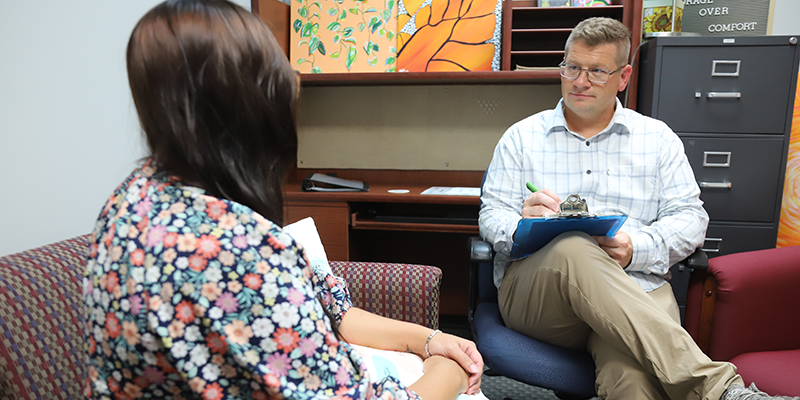
Students who are positively influenced by their peers will engage in new activities and make healthier choices.
RSU students have the opportunity to be mentored by students in the Master of Science in community counseling program, to help them through various challenges they are facing both in their personal and academic lives. These peer mentors are trained and supervised to assist their mentees in achieving their goals, with academic support, career guidance, social and personal support from managing stress, dealing with family or relationship problems, and acting as valuable resources for those seeking direction.
Peer to Peer (P2P) Mentors
Our mentors draw from their own experiences to help others navigate similar situations, offering insights and encouragement to foster personal and professional growth. We offer RSU students help with anxiety, psychoeducation, coping skills, career guidance, personal development and more.
Appointments and Availability
▶ Schedule an appointment with a mentor by email: [email protected]
Mentoring services are held in Baird Hall, room 201 (upstairs and at the end of the hall). Peer mentoring services are available:
- Monday – Friday | 9 a.m. – 4 p.m.
- Weekends based upon volunteer availability.
About the P2P Program
Rogers State University’s Peer-to-Peer Mentoring (P2P) program is designed to mobilize students to become agents of change for mental health and well-being on campus and beyond.
The MSCC Program created the P2P model to be an effective approach to shifting social norms that encourage positive health behaviors. We believe peers strongly influence the decisions and health behaviors of other students.
Increased student confidence, skill development, career advancement, and networking, along with new perspectives, are some of the evidence-based benefits from peer mentoring programs.
Generally young adults are more likely to seek help from their friends versus a health care provider initially, that’s why implementing the P2P program at RSU is an effective practice for all students and serves as an integral part of the MSCC Counselors-In-Training practicum coursework.
Goals of the P2P Program
Our goal is to expand the student’s network of individuals to provide support and intervene when needed, to create a system of modeling positive health behaviors promoting mindfulness and self-care which allows for avenues of mental health support for themselves and their fellow students.
- Reduce stigma and other barriers associated for seeking help when in emotional distress.
- Increase awareness of self-care for mental health and well-being.
- Increase awareness of services available and help-seeking behaviors.
- Create a culture of support for student well-being.
- Using shared experiences to offer help to friends or peers dealing with mental health conditions.






